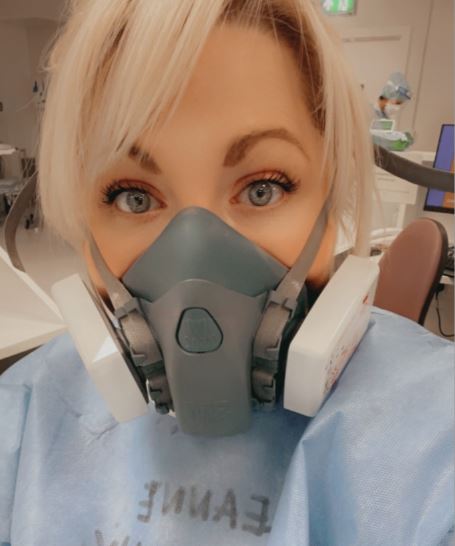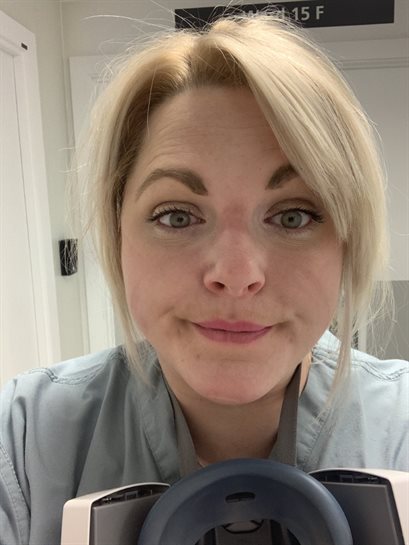One year on since the first Covid-19 patient was admitted to The Royal London Hospital (RLH) in March 2020, Senior Sister in Critical Care and De Montfort University Leicester Psychology graduate (2005-2008) Leanne McCarthy spoke to us to tell us about the grim realities of working on the frontline during the pandemic.
“I stood there, holding a camera phone on behalf of a family, recording while a patient took their last breath, thinking to myself, ‘please mum - stay at home’.”
On an intensive care unit, death is part of everyday life. Anyone who works on one long enough will meet patients who won’t recover.
But what is it like spending more of your working day with dead patients, than those still alive?
This is the grim reality NHS workers have faced in the last year.
Leanne McCarthy, a Senior Sister Critical Care Nurse at The Royal London Hospital (RLH), is one of those staff.

After graduating from DMU with a Psychology degree, she used those skills learned on the course to pursue a career in nursing. For the past year she has been on the NHS front-line, witnessing the impact of the Covid-19 pandemic first hand.
The harrowing effects of this work are stark and clear.
“I wake up in the night screaming and sobbing,” she said. “I can’t breathe.”
“I've got friends on anti-depressants. We all generally stop at the end of a shift and at some point, cry and then carry on.
“I got to a point before Christmas where I just stopped and said ‘I can’t see any more dead people, I can’t come to work’.”
When ICU staff, as professionally familiar with death as they are, start to feel this way, it is clear how profound the effects of Covid have been.
But how did Leanne, like many others get to this point?
Leanne, who is head of her team of nurses, said: “Normally on ICU we work with patients one on one. But for months we have been pushed and pushed where one-to-one patient care became one-to-four.
“You cannot give the care you need to give to four people when that’s what you would normally need for one person, it’s not possible.
“When you are on one-to-four patient care and you have a patient that is dying, it means you can’t even ring the family because there is no time. Patients die alone because not even we can be there to hold four people’s hands at the same time.
“That is one of the hardest parts in all of this, as a nurse you want to be there for people.”
With tight restriction preventing family members from being close to those on wards, Leanne at one point found herself setting up a camera for a patient’s family so they could watch their loved one’s final moments.
She said: “The words coming out of my mouth to the family didn’t even seem real: “Right I am going to put the camera on now and leave it next to the bed.”
With their determination to put patients first, and even though the hospital encourages regular breaks, Leanne said she and her team sometimes struggled to find time to eat during a shift.
She said: “There was many shifts my boyfriend just went mad at me because I would bring my dinner home with me day after day.
“He would say to me, ‘why haven’t you eaten your dinner again?’ and my response every time was, ‘I didn’t have time’.
“You do have to stop, but when do I stop? When do I say, ‘no I am sorry, I need to eat, so I have to sacrifice something for this patient’. I can’t do that.”

Leanne did her undergraduate degree in Psychology at DMU before her path took her down the route of another degree and training as a nurse in London.
She said: “In December one of my colleagues looked after an elderly patient with Covid and his daughter happened to be a psychologist. She put us touch with a company called Frontline 19, which involved psychologists who have given up their time to help NHS and Intensive care staff.
“I was allocated some free sessions which I really needed. I had reached a certain point and couldn’t go to work anymore, couldn’t help myself, my team or my patients. Those sessions helped a lot.”
Leanne and her team have recently worked with the wellbeing team to create some positive therapy by creating a silent disco breakout room.
“We have breakout therapy techniques now; we try and do what we can with wellbeing team. This is a place where staff can go to the silent disco for 10 minutes, just put headphones on and dance it out for a bit. Put your favourite song on and just dance, it helps more than you would realise.
“I can’t relax though, I sit on tenterhooks waiting for our numbers to increase every single day, we are supposed to rest now but all I can think is, ‘what the hell is going to come next’? We were so naive in the first wave.
“All I can say to anyone now is, ‘please have the vaccine’.”
Though she graduated in Psychology, Leanne said her route into nursing may not have been quite the same as others and as hard as the experience has undoubtedly been, it was a choice she has not regretted.
“This is a vocation. You are either that person or you are not.
“And the person inside me that is a nurse, would not allow me to walk away from a patient because I needed to eat.
“Unless I am literally about to fall on the floor and would be unable to help a patient with their care then I carried on no matter what.
“That is what we have all done, that is what every single nurse I have worked with has done and we have now done it for over a year.”
Posted on Tuesday 13 April 2021